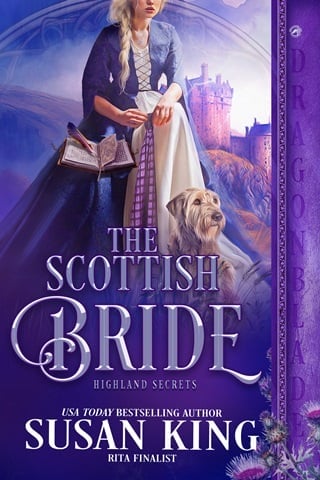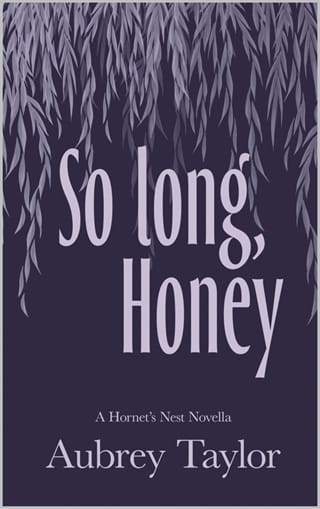Prologue
Veritas vincit (Truth conquers)
—Motto of Clan Keith
August 1306
Central Scotland
Hand over fist,she descended the rope, inching like a caterpillar on a branch. Cold wind whipped at her hair and cloak, chilled her hands where she gripped thick, rough hemp. Snowflakes fluttered over her cheeks and swirled away into darkness, down and down so far, she dared not glance there.
Looking up, she saw the soaring wall of the castle tower and the parapet above it. From a tower window, the rope draped over the stone sill. Clinging below, she whispered a prayer. If they discovered her escape, one swift cut to the rope would send her to her death.
Hurry, she thought as she shimmied downward. The rope swayed in a burst of wind. Beyond, the dark forest, trees lacy with ice, spread away from the snow-covered castle hill. She descended, hand over hand, keeping the rope between her feet just as her brother had taught her when they were younger. Her skirts belled out in the breeze, the chill cutting through her. Down and down she went. Far over the mountains, the sky lightened toward dawn.
Pausing to catch her breath, she looked down.
The rope was too short. Swaying, she gazed at the ground, then heard footsteps crunch over snow. A man approached to stand just below her.
A knight, a stranger. Chain mail glinted beneath his dark surcoat. The soldiers had found her. Glancing up, she knew she might not make the hard climb back to the window; her limbs ached, trembled. Stranded, clinging to the rope, she looked down.
The knight lifted his arms and beckoned.
"To me." His voice, deep and quiet, resonated.
Light touched his face, gleamed over armor. The wind whipped through his dark hair. He was beautiful, strong. An archangel. Still, she could not trust him.
"Down to me!" he beckoned again.
Swaying on the rope, she watched him. Buttery light touched the treetops, the snow, the knight. Shouts sounded in the distance.
"Leap!" He raised his arms.
An arrow whizzed past. Another.
She let go of the rope and sank.
He caught her solidly, safe as a rooted tree. Looping her arms about his neck, pressed against cold mail and woolen tunic, she felt his arms strong about her. She looked up into eyes washed blue, like ice or moonlight.
He smiled. "Safe now."
"Am I? Who are you?"
"Later for that." With long strides, he carried her toward the dark woodland.
"What do you want?" She pushed at him in sudden panic.
"I came," he said, "for you."
Tamsin sat up in the darkness, clutching the bedcovers. Just a dream.
Alone in the bed, she remembered again how lonely she felt here, a Scotswoman in a Scottish castle garrisoned by the English. A widow, now. Some measure of security had existed when her husband had commanded Dalrinnie Castle, but his death seven months ago left her status here uncertain. Soon, she had heard, King Edward would decide what to do with the Dalrinnie widow.
The dream merely stemmed from her desperate hope for an escape, she told herself. Sometimes her dreams held elements of foretelling, and a few times she had experienced brief visions like waking dreams, that came true in small ways. She kept such things to herself at Dalrinnie. Only her family could fully understand the gift that appeared now and then in their lineage.
But this dream was not prophetic. Escaping down a rope, arrows all around, a mysterious knight helping her—unlikely! Nightmares came of devils lurking about, so her childhood nurse once said. The dream just echoed her fear of a precarious situation.
Oh, but the knight… She sighed. If only someone could help her. Though allowed to leave the castle, she was always under guard. Still, if King Edward decided to send her to a convent, that might be all the escape she needed.
Two years ago, Sir John Witton had married Lady Thomasina Keith for political advantage and bedded her twice. When no child resulted, he left his "Scottish bride," as he called her, to her household tasks and "pretty parchments"—the books she so treasured. Her husband was an English lord in command of a castle captured from the Scots—Tamsin had heard the previous baron of Dalrinnie was a Seton, though she knew nothing of that family—and while Witton had King Edward's support, he had few allies among Scottish lords. Though most Scottish knights and nobles pledged to serve the English king, her kinsmen among them, many did so unwillingly.
In his will and testament, Witton had left Dalrinnie and its estate to his Scottish bride, a surprising gesture. Yet it hardly mattered now. King Edward had sent word that he would determine the widow's future. Then he let her wait.
Burrowing under the blankets, thinking of the knight in the dream, she remembered that her Grandda Thomas told her to always heed her dreams. He spoke sincerely, for Thomas of Ercildoune had been a prophet, a poet, a counselor to lords and kings, and a kind great-grandfather.
I see the gift bright in thee, lass,he had told Tamsin once, tugging on her golden braid. One day visions will fill thy head. What you will see is true. Remember that.
Bewildered, she nodded. Aye, Grandda.
Though he was gone seven years now, his legend still grew. They said that as a young man, he had been taken by the Queen of Faery, returning after seven years with the gift of prophecy. True Thomas, harper and poet, could not lie, and his wisdom was widely respected. When he visited Kincraig to consult with her father, Sir Robert Keith, and other Scots nobles, he always found time for Tamsin and her siblings, Henry, Margaret, and Rowena, his granddaughter's children. The Keiths of Kincraig were family to him.
One evening, Thomas had leaned toward her older brother Henry and poked him hard in the chest. Thee maun protect thy sisters, lad.
Henry nodded. Certes, it would be his chivalric duty one day.
Nah, nah. Listen. Each lass has a gift. Thee maun keep watch over them.
Henry knew that one day he would make an oath as a knight to serve King Edward the First of England, pressed like other Scottish knights to place his fealty where it might not sit. Once he inherited his father's lands and title, he would be guardian to his sisters if they were still unwed. My father will find good husbands for my sisters, Henry answered.
Thomas snorted. Our lassies need love matches, or none. You make sure of it. And thee, lad—the old man poked him again—seek what thy heart needs, too, and love and freedom will be yours.
But that is what all Scots need, sir, and cannot find under English rule.
One day, Thomas gave each child a gift. He handed Tamsin a wooden box containing parchments with verses he had scribbled, and an inkpot made of crystal. A queen gave this to me and now it is yours. You have the truthy tongue, lass. Use it wisely. Then he whispered what she must do with his work someday.
After that day, she never saw him again. Rumor said True Thomas had disappeared into a magical hillside to join the faery queen. But his son, another Thomas, sent word that his father, nearly one hundred years old, had wandered into the hills one afternoon and died.
Sighing, Tamsin lay back against the pillows. Thomas had wanted his great-grandchildren to marry for love. But Papa had wanted protection for his daughters and alliances for the Keiths in the climate of the conflict between Scotland and England. So Tamsin had been yoked to an English lord, the only daughter to marry before illness took her mother and father both, leaving Henry, serving Edward, to sort things out.
Now she was no longer the Scottish bride—instead, she was the Scottish widow, trapped among the English. In these two years, she had learned to stifle her "truthy tongue"—her natural, sometimes lamentable honesty—in favor of silence when she could manage it. Besides that simple honesty, she also protected the touch of the Sight that she carried.
One day, a quick, alarming vision had flashed in her mind seemingly from nowhere, an image of her husband fatally wounded in a skirmish. She summoned the courage to warn him to be wary.
"Always have your men around you," she pleaded. "I have seen danger for you."
He had half-listened, then dismissed her with a harsh laugh. "Scottish nonsense," he had said. But she saw the fearful look in his eyes.
Now, wrapping her arms around her knees, she sighed. Eventually that day came for him. And for her, silence and a measure of boldness became her armor in this garrisoned castle.
I came for you,the knight in the dream had said. Fervently, she wished it could be so, that she could escape and yet be safe. But she must solve this dilemma on her own.
Henry, she thought suddenly. Of course! Her brother, riding for King Edward now, might not know her situation had become so dire. He might be able to gain audience with Edward to argue leniency for his sister so that Tamsin could be free to determine her own path in life.
Henry's last message, months ago, said he was leaving Edward's castle at Carlisle to visit English-held Scottish castles. If his orders did not change, he thought to come to Dalrinnie and then Kincraig by Yuletide.
But she had to find him soon or lose all.
 Fullepub
Fullepub 



